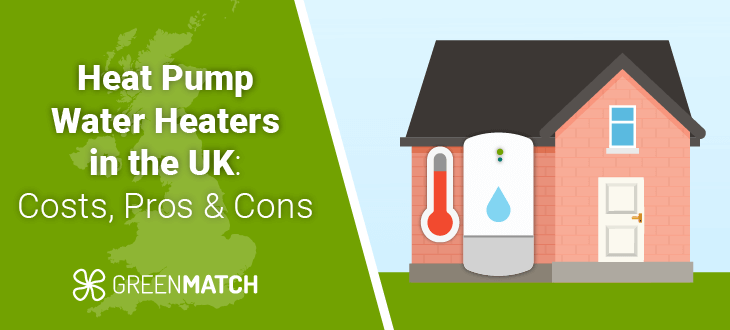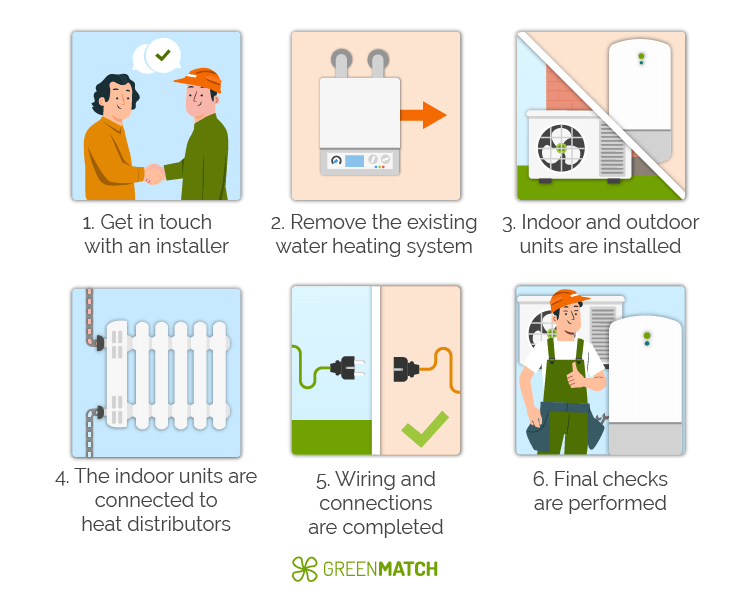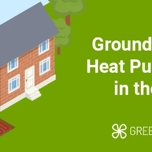Answer these simple questions and we will find you the BEST prices
Which type of solar quotes do you need?
It only takes 30 seconds
100% free with no obligation

Get up to 4 quotes by filling in only 1 quick form

Install a heat pump for less with the BUS grant

We’ve helped over 500,000 homeowners reduce their carbon footprint
- GreenMatch
- Heat Pumps
- Heat Pump Water Heater
Heat Pump Water Heaters In the UK: Costs, Pros & Cons 2026


- Heat pump water heaters are designed to efficiently heat water for tasks such as bathing, washing dishes, and laundry. They operate on the same fundamental principles as traditional heat pumps.
- Heat pump water heaters work by transferring heat from the outside air using electricity rather than directly generating heat by burning fossil fuels.
- The cost of heat pump water heaters in the UK ranges from £5,075 - £8,300, depending on your chosen model and its capacity, among other factors.
Saturday, September 23rd, marked this year’s autumn equinox, kicking off the start of shorter days as winter looms. For many of us living in the UK, this translates into more indoor time, higher heating use, and less daylight.
For this reason, now is an ideal moment to consider enhancing your home’s water heating system by opting for a solution that offers 2 to 3 times the efficiency of traditional gas boilers or older electric heaters. This article will delve into the workings of heat pump water heaters, discuss their costs and savings, highlight any available grants, and provide a thorough review to assist you in making a well-informed decision.
Interested in heat pump water heaters? We can help you get the best deal! Don’t waste hours contacting installers on your own. Simply fill out our 30-second form, and we’ll do the rest. We’ll connect you with up to 4 trusted installers near you for free, no-obligation quotes. Click below to get started!
- Quotes from local engineers
- Payment by finance available
- Save £7,500 with BUS grant
It only takes 30 seconds



What is a heat pump water heater and how does it work?
Heat pump water heaters are specifically designed to heat water for domestic use, while traditional heat pumps primarily focus on space heating and cooling. Both systems use electricity to move heat from one place to another and operate efficiently.
Having said this, it’s worth noting that the efficiency of a heat pump water heater relies on the system's quality, the calibre of the installation, the average temperatures of your region and the positioning of the compressor unit.
Heat pump water heater cost
The average cost of a heat pump water heater in the UK ranges from £5,075 to £8,300. Generally, these water heaters are more affordable than other types of heat pumps, such as air source heat pumps or ground source heat pumps.
Here’s an overview of how much you can expect to pay for a heat pump water heater in the UK:
| Heat pump water heater costs in the UK | ||
|---|---|---|
| Household size | Capacity | Cost |
| 1 bedroom | 120 litres | £5,000 |
| 2 bedrooms | 150 litres | £6,700 |
| 3 bedrooms | 180 litres | £8,300 |
These costs are estimates. Get a local installer QUOTE now!
It’s important to mention that the heat pump water heater prices shown above are a mere estimation and that the final cost will depend on heat pump sizing, referring to its capacity and how many litres of water it can process, as well as other relevant factors such as the brand, model, and the complexity of the installation.
Heat pump water heater savings
Despite the high heat pump water heater prices, replacing your boiler with a heat pump can yield significant savings. Heat pumps operate at 300-400% efficiency, compared to an average A-rated gas boiler's 92%. This means they produce 3 to 4 times more heat for every unit of energy used.
Heat pump water heaters in the UK offer a great balance between efficiency and cost. Although they rely on electricity, which is generally more expensive than gas, their high efficiency helps offset their price tag.
| Efficiency of different heating systems | |
|---|---|
| Heating system | Efficiency rating |
| Heat pumps | 300 to 400% |
| G-rated gas boiler | 70% |
| A-rated gas boiler | 92% |
| Electric heater | 100% |
Heat pump water heater grants
Currently, there are no heat pump grants available for heat pump water heaters in the UK. Existing schemes, such as the Boiler Upgrade Scheme, focus on technologies that provide both heating and hot water, such as air to water heat pumps or water source heat pumps, whereas heat pump water heaters only produce hot water. As a result, these systems do not qualify for funding.
There is potential for future support through initiatives like ECO4, particularly for installations in social housing. However, the new phase of ECO4, which may include funding for heat pump water heaters, has not yet been implemented. As energy policies evolve, there may be opportunities for these efficient systems to receive government incentives in the future.
Heat pump water heater advantages and disadvantages
- Environmentally friendly: Heat pump water heaters use electricity to transfer heat, offering a fantastic alternative to traditional fossil fuels. Pairing them with solar panels is highly recommended for optimal efficiency and sustainability.
- High efficiency: Heat pump water heaters are 2 to 3 times more efficient than more traditional electric water heaters, allowing you to use up to 3 times less electricity to heat water.
- Extended durability: Heat pump water heaters are more durable, lasting up to 15 years, compared to the typical 10 to 12 years of standard electric water heaters.
- Quiet operation: These heat pump water systems operate quietly, like refrigerators.
- High upfront cost: Heat pump water heater prices can be quite high, ranging from £5,075 to £8,300.
- Slower water heating compared to alternative heaters: While highly efficient, this heat pump for water heating takes more time to heat water than more traditional water heaters.
- Incompatible with some homes: These heat pumps require sufficient space and must be installed near an external wall.
- Not designed for central heating systems: Heat pump water heaters are designed to provide hot water for domestic use, not central heating.
Air source water heater installation and maintenance
Air source heat pump installation typically begins with getting in touch with a qualified installer. This professional will first thoroughly inspect your property to assess its suitability for the heat pump water heater system. Once the site is deemed suitable, the installer will proceed with the following key steps:

The installation of the heat pump water heater will typically take 1 to 3 days, depending on the complexity involved in the design and planning process. It's crucial to have at least 28.3 cubic metres of air space around the water heater and to install it in a location with excess heat, such as a furnace room.
Similar to their air to air heat pump counterparts or any other heat pump for that matter, they require some maintenance after installation to ensure optimal performance throughout their lifespan. Luckily, this only involves occasional checks to ensure the system operates accordingly. By doing this, you can avoid the possibility of incurring any additional repair costs.
Furthermore, consulting with a qualified plumbing and heating contractor is always advisable to ensure proper installation and compliance with local building regulations.
Is a heat pump water heater the right choice for my home?
These systems stand out for their affordability compared to other heat pump costs and their remarkable efficiency rating ranging from 300% to 400% compared to more traditional water heaters. Their high efficiency means that for every unit of energy consumed, a heat pump water heater can produce three to four times more hot water, making them an attractive long-term investment.
While heat pump water heaters require significant upfront investment and currently lack government grant support, they still offer an exceptional opportunity for environmentally conscious homeowners seeking highly efficient water heating solutions. So, if you’re looking for your next best air source heat pump, they’re well worth the consideration.
The cost of heat pumps will be affected by potential extras and installation costs, which vary by installer. That’s why it’s best to compare several installers in your area. Instead of spending days on research and comparisons on your own, why not fill out our 30-second form and let us do the rest? We’ll find you up to 4 free quotes from trusted installers in your area. Click below to get started!
- Quotes from local engineers
- Payment by finance available
- Save £7,500 with BUS grant
It only takes 30 seconds



FAQ
Yes, investing in a heat pump water heater is worthwhile due to its remarkable efficiency ratings of up to 400% compared to traditional water heaters. Additionally, it is more affordable than other heat pump models.
The main disadvantages of heat pump water heaters are their high upfront costs, which range from £5,075 to £8,300, and slower water heating times compared to traditional systems
Yes, heat pump water heaters are economical due to their impressive efficiency ratings of 300% to 400%. These ratings lead to significant long-term savings on energy bills despite their higher initial costs.
A heat pump water heater can replace a boiler for domestic hot water production but not for central heating. These systems are designed to heat water for bathing, washing dishes, and laundry.
Heat pump water heaters in the UK typically cost between £5,075 and £8,300. The exact cost depends on factors such as the system’s capacity, the brand and model chosen, and the complexity of the installation process.

Alejandro is a copywriter at GreenMatch and is passionate about European environmental policy and renewable energy. He has conducted research on the European Green Deal’s impact on EU energy policy and climate adaptation, and he is committed to using his writing skills to promote sustainable policies.

We strive to connect our customers with the right product and supplier. Would you like to be part of GreenMatch?

- Heat Pump Water Heaters In the UK: Costs, Pros & Cons 2026
- What is a heat pump water heater and how does it work?
- Heat pump water heater cost
- Heat pump water heater advantages and disadvantages
- Air source water heater installation and maintenance
- Is a heat pump water heater the right choice for my home?
- FAQ



